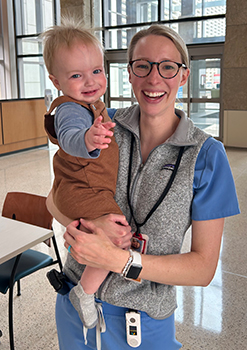Cara Saxon, MD, wanted to be a cardiologist. And she wanted to become a mother. But doing both well seemed impossible back when she started residency at the University of Colorado School of Medicine (CU SOM) in 2019.
“Being a mom in medicine has so many challenges, and that’s not often discussed,” says Saxon, 32. “I felt isolated and boxed in by my options.”
Then, in 2020, Saxon decided to enroll in a coaching program designed to help medical trainees see their strengths, weaknesses, attitudes, and goals in a new — and healthier — light.
“It slowly helped me see the role I was playing in limiting myself,” she says of Better Together, an online coaching program CU SOM had just launched for medical residents. “I learned that thoughts are habits. I started to challenge my thoughts — my perfectionism and self-doubt — and I began to see that I can decide how I want to live out my values.”
Today, Saxon has a 2½-year-old son and a thriving career as a UC SOM cardiology fellow. “I simply wouldn’t have been able to have a child and be a cardiologist without coaching. It has been a huge gift,” she says.

Across the United States, thousands of medical trainees are receiving coaching services in programs that sometimes span all four years of medical school and often are required. Though programs generally focus on students, some offer services to residents as well.
The supports provided range from goal setting to study strategies and professionalism to confidence boosters. They help trainees process the mounds of feedback they receive — test scores, class grades, and clinical comments, among others — and develop plans to address any shortcomings and build on existing assets.
Such efforts are on the rise. “Twenty or so years ago there were no coaching programs in medical schools. “Today, one-third to half have one,” says Nicole Deiorio, MD, who has written extensively on the topic and launched the coaching program at Virginia Commonwealth University School of Medicine.
A 2022 surgeon general’s advisory on clinician burnout recommended coaching, and the Coalition for Physician Accountability advises using it to ease the often difficult transition from medical school to residency.
Executive coaching has exploded in the United States in a range of industries, from finance to high tech. It generates $14 billion annually and, due to retention and enhanced skills, is estimated to produce a return on investment as high as 600%. But does coaching work well in the world of medicine?
Research suggests it does, showing improved outcomes in areas such as clinical competency and physician well-being. In one study, burnout dropped 22% among physicians who received coaching, while it rose 2.5% in a control group.
“Coaching is especially valuable in medical education,” says Dana Dunne, MD, director of coaching at Yale School of Medicine in New Haven, Connecticut. “A lot of students arrive from college highly performance oriented, used to getting gold stars. They need to switch to a growth mindset, to be people who are comfortable recognizing what they don’t know. Coaching is a safe environment for doing that.”
Noriko Anderson, MD, MPH, a neurologist and coach at University of California, San Francisco, School of Medicine (UCSF SOM), points to what she considers a fundamental value of coaching: “Medical school is incredibly demanding. I tell students, ‘I understand what you’re going through. I’m here for you. I am in your corner.’”
Still, many questions remain: How does a coach differ from an advisor or a mentor? What, exactly, happens in a coaching session? And how can medical trainees get the most out of coaching, given their already packed schedules?
What, exactly, is coaching?
Coach, mentor, advisor — the terms certainly may seem interchangeable. But medical educators say that despite some overlap, the three are not the same.
“A mentor mostly tells you what to do so you can be like them. An advisor typically tells you things like what you need to do to graduate,” says Dunne. “A coach mostly asks you questions. ‘How do you know when you’re doing well?’ ‘What does success look like for you?’ ‘What has helped you make decisions in the past?’
“The premise is that the person has the answers and the coach is there to help them come up with a plan to achieve their goals.”
Taimur Dad, MD, director of the coaching program at Tufts University School of Medicine in Boston, points to another key difference. “Coaches are meant to be purely supportive, not evaluative. Unlike advisors or mentors, our coaches never grade students or write letters of recommendation for them,” he says.
Elise Wolf, a second-year student at Yale School of Medicine, is glad she has a coach in addition to an advisor and potential mentors. “I don’t see my advisor as often, so he doesn’t know me as well,” she says. “Also, I sometimes worry about reaching out to faculty, who are so busy. But I don’t worry about that with my coach, because I know the school has carved out time in his schedule.”
Although they align in certain basic areas — a coach sticks with the same students over time, for example — coaching programs vary a great deal, says Dad. “Because the field doesn’t yet have an agreed-upon model, and each school has its own needs and resources, each program takes its own approach.”
At UCSF SOM, for instance, coaches also teach their assigned students clinical skills — though they don’t grade them. “The idea is that we are taking a coaching approach to teaching. Coaches get to understand each student and can target their teaching to the person’s individual goals and particular strengths,” says Andrea Marmor, MD, a clinical pediatrics professor and director of the school’s student coaching program.
Programs vary in other ways as well. Some have coaches meet just one-on-one with trainees, while others also create coaching groups. Some have students meet with coaches quarterly; others, much more often.
One unique effort is the program Saxon found helpful — CU SOM’s Better Together, which has now expanded nationwide on a not-for-profit basis. There, coaching is provided exclusively online to institutions that enroll a group of students, residents, or clinicians. Participants select from a variety of options, including Zoom coaching calls, self-paced modules on topics such as impostor syndrome, and written replies sent in response to specific queries. Sessions aren’t always with the same coach, though.
The approach is quite popular. Where it’s offered, one-third of trainees usually opt to participate, for a total of some 4,000 participants so far, says Adrienne Mann, MD, a CU SOM associate professor who cocreated the program. Data also suggest it’s having an impact, with participants experiencing such benefits as a significant increase in self-compassion.
The field still has more work to do to accumulate hard-core measures of success, says Delphine Taylor, MD, a professor of medicine and director of the coaching program at Columbia University Vagelos College of Physicians and Surgeons in Manhattan. “We don’t have a lot of literature that randomizes students to coaching versus control groups,” she says.
The coaching conversation
Although coaching programs vary, all share similar goals: deepening trainees’ understanding of their assets, shortcomings, and ability to grow.
At UCSF, coaches ask students to set two goals at each session, one academic — set a consistent study schedule, for example — and one nonacademic — eat healthier, perhaps. “We ask students to do prework so they can come prepared to talk about their goals, and then we follow up on how they’re doing at our next meeting,” explains Anderson.
At Columbia, sessions often help students digest all the grades, scores, and narrative feedback in their academic dashboards. “We ask them to really reflect on the data,” says Taylor. “‘What did you notice? Did anything surprise you? Did you have a strong emotional reaction to any of it?’ Without support, learners tend to focus on the negative feedback and shy away from corrective action. The coach helps them create realistic goals and be accountable for those goals.”
Whatever the format, coaching sessions always include the opportunity for trainees to raise their own concerns.
Zoë Gilbard, a fourth-year Tufts School of Medicine student, has shared a range of issues with her coach. “She was helpful when I was picking my specialty, because she knew me so well and she knew how aspects of my personality would align with my career options.” Her coach has also supported her through some tough times. “I had a parent who was very ill, and we talked about how to handle someone close to you being sick. That’s not discussed enough in medicine. Doctors are seen as sort of impervious.”
Coaches also help students navigate a medical system that can seem full of strange and secret rules, says Marmor. “For example, students may want to discuss when — and how — to speak up if they fear a patient isn’t receiving the best possible care,” she says.
Such situations can be particularly hard for students from backgrounds that are underrepresented in medicine, she adds. “They may have no one in their family or town to turn to for guidance. A coach can be an ambassador to the hidden curriculum, someone they can trust if they have tough questions,” she says, referring to unwritten educational norms and expectations.
Ultimately, coaching conversations aim to help learners understand themselves better both as medical professionals and as people, says Mann.
She offers an example: A resident can’t seem to complete their patient notes in a timely fashion. “The coach can ask what beliefs or fears are underlying the behavior. Maybe the person is afraid that their notes won’t be perfect and people will find out they don’t belong there.”
“We talk about the stories they’re telling themselves that aren’t true and are holding them back,” she says. “The ultimate goal isn’t to get them to crank out notes faster. It’s for them to have a better relationship with themselves.”
Making the most out of coaching
Medical school entails long hours, high-stakes exams, massive amounts of complex information, and intense competition for residency slots. So how can trainees best use coaching to handle all that?
Coaching leaders advise checking out offerings even before enrolling in medical school. “If coaching is important to you, ask about the training that coaches receive,” says Deiorio, who contributed to the creation of recommended competencies for coaches in medical education. “Some provide coaches with ongoing, in-depth professional development sessions. Training can be a proxy for how serious a program is,” she adds.
Once coaching begins, “give yourself grace in getting used to it,” suggests Marmor. “Not everyone feels comfortable sharing with someone new. Give yourself permission just to be yourself and go at your own pace.”
If coaching involves preparatory homework, take those assignments seriously, advises Wolf. Yale requires her to complete a form with several questions before each coaching session. “I could just say I’m doing better at physical exams, for example. But if I’m more thorough and reflect on specific aspects of my performance, then I can see specific strengths and how I might build on them.”
Being thorough in sessions also allows coaches to better recommend valuable resources. “Coaches can connect students with many supports — learning specialists, mental health services, and research advisors, for example,” says Caroline Nelson, MD, an assistant professor of dermatology and a coach at Yale.
Perhaps most important is being open and honest with a coach. “Don’t say you’re OK if you’re not,” advises Nelson. “Be open to taking a broader, 360-degree view of yourself. Be willing to gain insight into how you think and how you approach the learning process.”
“Remember that coaching is not just about any one issue you’re facing now,” she continues. “Coaching is about establishing patterns that will serve you for the long term of your career. That’s why it’s so incredibly valuable.”

